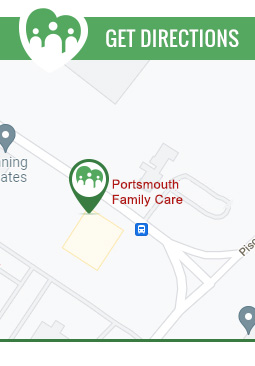Diabetes Management: Tips for Lowering Blood Sugar by Diabetes Specialist
Effective diabetes management is key to maintaining a healthy lifestyle. At Portsmouth Family Care, Board-Certitifed Dr. Keenan Al-Hojerry, MD, and our dedicated team offer advice on practical strategies to help lower blood sugar levels. From implementing a nutritious diet to staying active and regularly monitoring your glucose, we emphasize a holistic approach. Our team works with each patient to develop personalized care plans that focus on long-term health, preventing complications, and ensuring a sustainable, healthy lifestyle. For more information, contact us today or schedule an appointment online. We are conveniently located at 101 Shattuck Way Suite 2 Newington, NH.


Table of Contents:
How can a diabetic lower blood sugar quickly?
What is the normal blood sugar level for those who have diabetes?
Why is it important to lower your high blood sugar?
What are the warning signs patients should know of high blood sugar?
While diabetes is a serious illness, many people manage it well and live productive and meaningful lives. One way you can manage diabetes effectively is by knowing how and when to lower blood sugar.
If you have diabetes and need to lower your blood sugar quickly, the best course of action is to take fast-acting insulin. Fast-acting insulin is especially important to take if you are experiencing a hyperglycemic emergency, as it helps your body’s cells absorb blood sugar to use it for energy. This type of insulin acts most similarly to the insulin that your pancreas produces and is administered through injection. It starts working approximately 15 minutes after injection, reaching peak effectiveness around one to two hours after injection and lasting for two to four hours.
Some other tips for lowering blood sugar in the long term include:
• Exercising often
• Staying hydrated
• Limiting your carbohydrate intake
• Increasing your fiber consumption
• Regulating your calorie intake to maintain a healthy weight level
• Choosing foods that are low on the low glycemic index
• Managing stress levels
• Prioritizing healthy sleep habits
• Increasing intake of chromium and magnesium
• Eating healthy snacks
• Including probiotic-rich foods in your diet
Blood sugar levels are measured according to the number of milligrams (mg) of glucose that is in every deciliter (dL) of your blood. A decilitre is 1/10 of one liter of fluid. Further, blood sugar tests measure your blood sugar level in two situations — after fasting and two hours after meals.
With that in mind, a normal blood sugar level after fasting for those who have diabetes is 80 to 130 mg/dL. The normal blood sugar for a person with diabetes two hours after a meal is less than 180 mg/dL. In contrast, the normal blood sugar level for someone without diabetes is 70 to 99 mg/dL after fasting and less than 140 mg/dL two hours after eating.
High blood sugar can cause problems in both the short term and the long term. In the short term, some of the symptoms that high blood sugar can cause include:
• Dry mouth and increased thirst
• Frequent urge to urinate
• Increased fatigue and weakness
• Blurry vision
• Dehydration
• Headache
High blood sugar also negatively impacts your long-term health and increases your risk of various diseases. Some of these conditions and health issues include:
• Cuts and sores that don’t heal or take longer than usual to heal
• Heart disease
• Increased risk of infections
• Kidney disease
• Nerve damage
• Neurological conditions
• Stroke
• Vision loss
• Weight loss
Considering the short-term and long-term effects of high blood sugar, lowering your blood sugar is an important way to prevent serious illness if you have diabetes or hyperglycemia.
As mentioned, the early symptoms of high blood sugar include heavy thirst, blurry vision, excessive urination, tingling, and fatigue. If you notice these symptoms, it’s a good idea to take steps to lower your blood sugar by exercising and drinking lots of water. You may also want to eat foods that have a low glycemic index, are low in carbohydrates, and are high in fiber and probiotics.
If you experience vomiting, rapid heartbeat, confusion, or loss of consciousness along with common symptoms of high blood sugar, you could be experiencing diabetic ketoacidosis (DKA). DKA is a severe blood sugar complication that can be life-threatening. Thus, you should go to your nearest emergency room if you experience those symptoms.
Keeping blood sugar levels at healthy levels is an important part of diabetes management. At Portsmouth Family Care, our primary care physician can help you manage your diabetes in effective ways. For more information, contact us today or schedule an appointment online. We are conveniently located at 101 Shattuck Way Suite 2 Newington, NH. We serve patients from Portsmouth NH, Newington NH, Durham NH, Madbury NH, Dover NH, Greenland NH, Stratham NH and surrounding areas.

Additional Services You May Need
▸ Diabetes Management
▸ Family Medicine Physician
▸ Primary Care
▸ Sexual Medicine Doctor
▸ Weight Management
▸ After Hours Care
▸ Women’s Health Exam
▸ School/Sports Physical
▸ Executive Physical
▸ Annual Physical
▸ Adolescent Medicine

Additional Services You May Need
▸ Diabetes Management
▸ Family Medicine Physician
▸ Primary Care
▸ Sexual Medicine Doctor
▸ Weight Management
▸ After Hours Care
▸ Women’s Health Exam
▸ School/Sports Physical
▸ Executive Physical
▸ Annual Physical
▸ Adolescent Medicine





